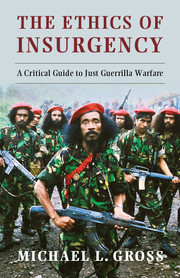Book contents
- Frontmatter
- Dedication
- Contents
- List of Tables
- Preface
- List of Abbreviations
- Map
- 1 Just Guerrilla Warfare
- Part I The Right to Fight
- Part II Hard War
- Part III Soft War
- 7 Terrorism and Cyberterrorism
- 8 Economic Warfare and the Economy of War
- 9 Public Diplomacy, Propaganda, and Media Warfare
- 10 Civil Disobedience and Nonviolent Resistance
- Part IV Concluding Remarks
- References
- Index
8 - Economic Warfare and the Economy of War
Published online by Cambridge University Press: 18 December 2014
- Frontmatter
- Dedication
- Contents
- List of Tables
- Preface
- List of Abbreviations
- Map
- 1 Just Guerrilla Warfare
- Part I The Right to Fight
- Part II Hard War
- Part III Soft War
- 7 Terrorism and Cyberterrorism
- 8 Economic Warfare and the Economy of War
- 9 Public Diplomacy, Propaganda, and Media Warfare
- 10 Civil Disobedience and Nonviolent Resistance
- Part IV Concluding Remarks
- References
- Index
Summary
Economic warfare and the structure of a guerrilla organization’s war economy represent two distinct ethical dimensions of insurgency. Economic warfare, the subject of the first part of this chapter, designates the use of military power to disrupt the local economy. For states, the prime tactics are economic sanctions and blockades. For guerrillas who lack the means to impose sanctions or blockades, the tactics of choice are terror attacks to disrupt tourism and other economic activity. Economic warfare is a coercive tactic that often precedes military force in the hopes of preventing or shortening a war. Like public diplomacy, economic warfare is virtually unregulated by international law and just war theory. Yet the simple fact that economic warfare targets civilians directly creates a host of ethical difficulties for its practitioners.
The economy of war is the subject of the second part of this chapter and designates the methods insurgents use to raise funds for weapons and recruits. Unlike their adversaries, guerrilla organizations lack coercive state institutions to collect taxes or the wherewithal to issue bonds. As a result, insurgents resort to various schemes to raise the money they need to wage war. These range from quasi-voluntary taxes, which guerrilla organizations levy upon their diaspora community, to drug trafficking and money laundering. Important ethical issues remain unaddressed by just war theory: What economic measures may insurgents employ as they pursue just war? To what extent may guerrilla organizations coerce constituents to contribute funds to the cause? Are unlawful activities morally permissible to raise the funds necessary to dislodge an occupying army? Akin to a state’s right to levy taxes, guerrillas may also look beyond voluntary appeals to raise money for men and materiel.
- Type
- Chapter
- Information
- The Ethics of InsurgencyA Critical Guide to Just Guerrilla Warfare, pp. 184 - 212Publisher: Cambridge University PressPrint publication year: 2015



